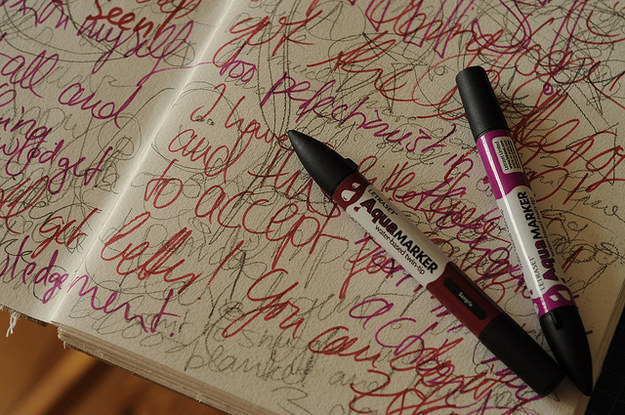Tuck these away for dark days.
Jenny Chang / BuzzFeed
We members of the BuzzFeed Community and a few mental health experts to share the best ways to take care of yourself when you’re depressed.
Whether you’re dealing with depression or just in a serious funk, here are some tips for making life feel a little more manageable.
Grab a coloring book.
“It’s completely juvenile, but I have Disney princess crayons and a ton of coloring books and it’s very therapeutic. And gives me a nice feeling of accomplishment even if it’s just coloring.” —Emily Murphy, via Facebook
Make a “done” list instead of a “to-do” list.
“It sounds ridiculous, but when I can’t pull out of a nose dive I list all the things I accomplished that day, no matter how small. Did I shower? Makes the list. Did I make food? It goes on the list. By the end of the day I have a much bigger account of the day than I thought and that always helps push back that feeling of worthlessness.” —Catherine R Cherry, via Facebook
Build a “make life a little easier” toolkit.
“I have a Happy Box that has some funny movies, a word search book, a nice smelling candle, and some spa-like beauty products to calm me down. It also has a journal, a favorite book, and some memories from happy times.” —
Save kind words so you can look back over them later.
“I have an ‘atta girl’ file in my work email. Every time I get a positive message from my boss or a co-worker, I save it in that file so that when I feel down I can go back and read through all the nice words people have said to me.” —Ashley Coffman, via Facebook
Let yourself cry.
“I cry. A lot. It sounds very sad, but sometimes I’ve been walking around with a cloud over my head for days or weeks, smiling and working like nothing was wrong. I need a moment to let everything that has built up to be let go. So I watch a movie with a tear-jerking happy ending and I cry. It’s OK to cry. Never be ashamed of crying.” —Gwen Miller, via Facebook
Make a gratitude list.
Write down everything you’re thankful for, from big (like having a roof over your head) to small (like your Netflix account). “Reminding yourself of what you have leads to appreciation that helps you feel measurably more content,” clinical psychologist Andrea Bonior, Ph.D, tells BuzzFeed Life.
Volunteer at an animal shelter, play with friends’ pets, or foster or adopt your own.

“Honestly, what’s helped me the most has been animals. Playing with them and caring for them. They give you so much love and have made me so happy during these dark moments in my life.” —Shannon Montague, via Facebook
Maintain a regular sleep schedule.
When you get too little or too much sleep, you want to be inactive, your thoughts get muddy and unclear, and depression will feel that much worse, clinical psychologist Jennifer Taitz, Psy.D., tells BuzzFeed Life. Commit to sticking to a regular sleep schedule by setting a bedtime and wake time—and don’t hit the snooze button.
Get ready for the day even if you plan on staying inside.

youtube.com / Via escapegif.tumblr.com
“If you’ve been bed-ridden for days and you can’t get out of the darkness, the best way is to take it a little at a time. Take your toothbrush and face wash into the shower with you and take a super long hot shower. Brush your hair, do your makeup (if you wear any), and put on your comfiest clothing that you feel good in.” —Maegan Bassett, via Facebook
Be social, even if it means just showing up.
“You don’t even have to participate in the conversation if you don’t want to. Get together with a group of friends who you love and who love you, and just exist with them. Listen in on conversations. The thoughts, laughs, topics, and shenanigans may help keep your mind off of things just for a little while, and for me, that little while is enough to pull me out of a dark night.” —
Don’t listen to sad music even if you want to. Create a happy playlist instead.

Al Boardman / Via alboardman.tumblr.com
Research shows that music has the power to induce a mood, so prep a few uplifting playlists ahead of time. “It feels validating to listen to sad music when you’re depressed at first, but it’s actually an easy way to get stuck in that mood,” says Taitz.
If you need a place to start, you might like that will instantly put you in a good mood or .
Make your bed every day.
Here’s the thing about making your bed: It takes two minutes, makes your space feel more put together, gives you a quick sense of accomplishment, and once it’s done, you’re much less likely to crawl back in and waste the day away. So do it.
Cuddle up with Netflix, but don’t fall down the rabbit hole.

Watching an episode of Parks and Rec when you’re feeling depressed is a great pick-me-up. Watching an entire season is definitely not. “People have come to me profoundly depressed after Netflix binges,” says Taitz. “Treatment for depression is getting active, and feeling purposeful and accomplished. Watching TV is passive.”
Instead, use your favorite comfort TV show as a reward for productivity, a way to wind down at the end of the day, or as a social activity. This site lets you sync up Netflix with others remotely so you can watch with a friend even on days you can’t get out of bed.
Decorate your space so you actually like being there.
“A lot of times, when people are depressed, their apartment looks depressing,” says Taitz. Take good care of your living environment—clean it, decorate it to reflect your tastes, make it a place you want to exist in, not disappear from.
Try to find healthy food to eat.

Photograph by Yael Malka for BuzzFeed / Via
Comfort food is delicious and great in moderation, but when people are depressed, they sometimes eat more than they mean to. Then next thing you know, you feel like crap, physically and mentally. “It’s a cycle,” says Taitz. “You feel down, so you eat, then you gain weight, then you don’t want to go out.” Eating healthy foods will at least make you feel healthier physically even when you’re emotionally a wreck.
If you don’t know where to start when it comes to eating healthy,
Make a list of things to do when you’re feeling overwhelmed with the world.
http://instagram.com/p/2lYt9PJy_Y
“When I was in an out-patient treatment program for anxiety and depression as a teen, one of the teachers there suggested that I take small strips of paper and write all the things I liked to do; things that made me feel better, made me happy, made me calm. She then took these strips of paper, put them in a small box, and said to me, ‘Now, when you feel the world closing in, pick one of these pieces up and do the activity on it.’” —Meg Loewen, via Facebook
Pick up a hobby that has room for improvement.
http://instagram.com/p/2otTnCMZR-
That means finding activities that won’t just give you pleasure, like watching TV, but will also give you a sense of accomplishment. It could be anything from painting to learning guitar to running more miles to finishing a book—anything that you can get better with over time.
Write down your negative thoughts.

distelfliege / Creative Commons / Via Flickr: distelfliege
Getting bad thoughts out of your head and onto paper separates them from you. Keep it simple, though: Write down a thought and move on. If you go on for pages and pages, it’s not going to help, says Taitz.
Get out on the open road.

Faramarz Hashemi / Creative Commons / Via Flickr: fhashemi
“My first instinct when my depression surfaces is to drive. Crank up the radio and listen to my current favorite playlist, hop on the interstate and just go. Nowhere to be, leave my problems back where they found me, and physically distance myself from whatever is stressing me so I can get some perspective.” —Christa Mae Stephens, via Facebook
Spend time in the kitchen.

Kate Hiscock / Creative Commons / Via Flickr: slightlyeverything
“For some reason, cooking and baking really help me when I’m having a particularly bad day. There’s something zen about the process that soothes my soul, especially baking bread. Plus, it encompasses all the senses and occupies my mind. It’s sort of magical to watch simple ingredients like flour and yeast become a beautiful loaf of bread.” —Nikki Ourand Lambert, via Facebook
Put affirmation where you’ll see it.
http://instagram.com/p/IxPi7SRMZA
“I use chalk paint markers to write quotes that inspire me on all my mirrors in my room. I try and change them every week or two, usually something that moves me or has to do with something I’m currently struggling. Every time I do my makeup or hair, I take a moment to read aloud the things I’ve written and really soak them in.” —Rebecca Bowman, via Facebook
Cut unnecessary responsibilities out of your life.
We go on autopilot and do rituals without asking ourselves what really matters—and then wind up overwhelmed with trying to fit everything in. Which emails can go without an instant reply? What stuff can you delegate to a coworker or a partner? You don’t have to do it all. If you don’t know where to start trimming, Taitz suggests setting a few goals each week and cutting things that aren’t necessary to those goals.
Go outside.

vimeo.com / Via alxbngala.tumblr.com
Even if it’s just for a brisk walk (which will get endorphins pumping, by the way), enjoying nature has many benefits. “Daylight boosts mood and helps regulate sleep/wake patterns, and nature helps calm our thoughts and get rid of distractions,” says Bonior.
Plan your week so you don’t make decisions based on your mood.

To keep yourself of falling into a cycle of “I’ll do it tomorrow” while you spend your days in bed, Taitz suggests planning your week in advance to make sticking to day-to-day life easier. You can also write down how you felt after doing each activity so you can remind yourself in the future that getting out into the world makes you feel better, even when you don’t want to at first. Taitz likes this 8 Days-a-Week Planner Pad.
Find an exercise that you actually enjoy.
http://instagram.com/p/2om3EnyOK2
“Zumba classes have also helped me a great deal. It’s not for everyone I know, but finding something you enjoy is a winner. I look forward every week to my classes. For an hour I get lost in the music and leave with a huge smile on my face and an endorphin high. I try to make myself go even when all I want to do is get under my duvet and hide from the world and it never fails to lift my mood.” —
If Zumba isn’t your thing, check out or .
Look over your longterm goals.

Looking forward to things can be hard when you have depression, says Taitz, so it’s helpful to have a big list of everything you want to do on hand to look at when things get tough. They could be concerts you want to go to or places you want to travel; whatever helps you look forward.
Pamper yourself.
When you’re dealing with depression, it’s easy to think that you don’t deserve to be treated with kindness—which is exactly why going out of your way to pamper yourself is an important part of self-care, says Taitz. Go all out with the spa treatment. Light candles, take a bubble bath, get a massage, pour a glass of wine…whatever it takes to get yourself to relax as much as you can.
Disappear into a book.
“Reading just makes me feel better because I can escape as well as feel like I’ve accomplished something once I finish. It’s a great feeling because sometimes I get stuck and feel like I can’t move or do anything, which then will make me feel guilty. So if I just take it easy and read, I’ll feel better.” —Amanda Thompson, via Facebook
Volunteer for a cause you really care about.
There’s something about realizing how much you can contribute to the world that’s therapeutic and transformative, says Taitz.
Meditate.
http://instagram.com/p/2ZNDXULpEW
“Meditation is huge for me. It helps me take my focus away from my pain and sadness and redirects it to things that make me feel happy. While meditating, I count all the things I am grateful for. Be grateful for the larger things, be grateful for the smallest things, be grateful for any little thing you can think of.” —Erika Castro, via Facebook
Don’t rely on yourself to get better.
These suggestions are a great way to make your depression feel a little lighter. But you should never be afraid to seek treatment, whether in the form of talking to someone (find out how to find the perfect therapist ), taking medication, or another method. It’s not all on you.
To learn more about depression, check out the resources at the National Institute of Mental Health here.
If you are dealing with thoughts of suicide, you can speak to someone immediately here.
If you want to speak with someone anonymously, go here for additional help.
And there is the National Suicide Prevention Lifeline, which you can reach at 1-800-273-8255.

















